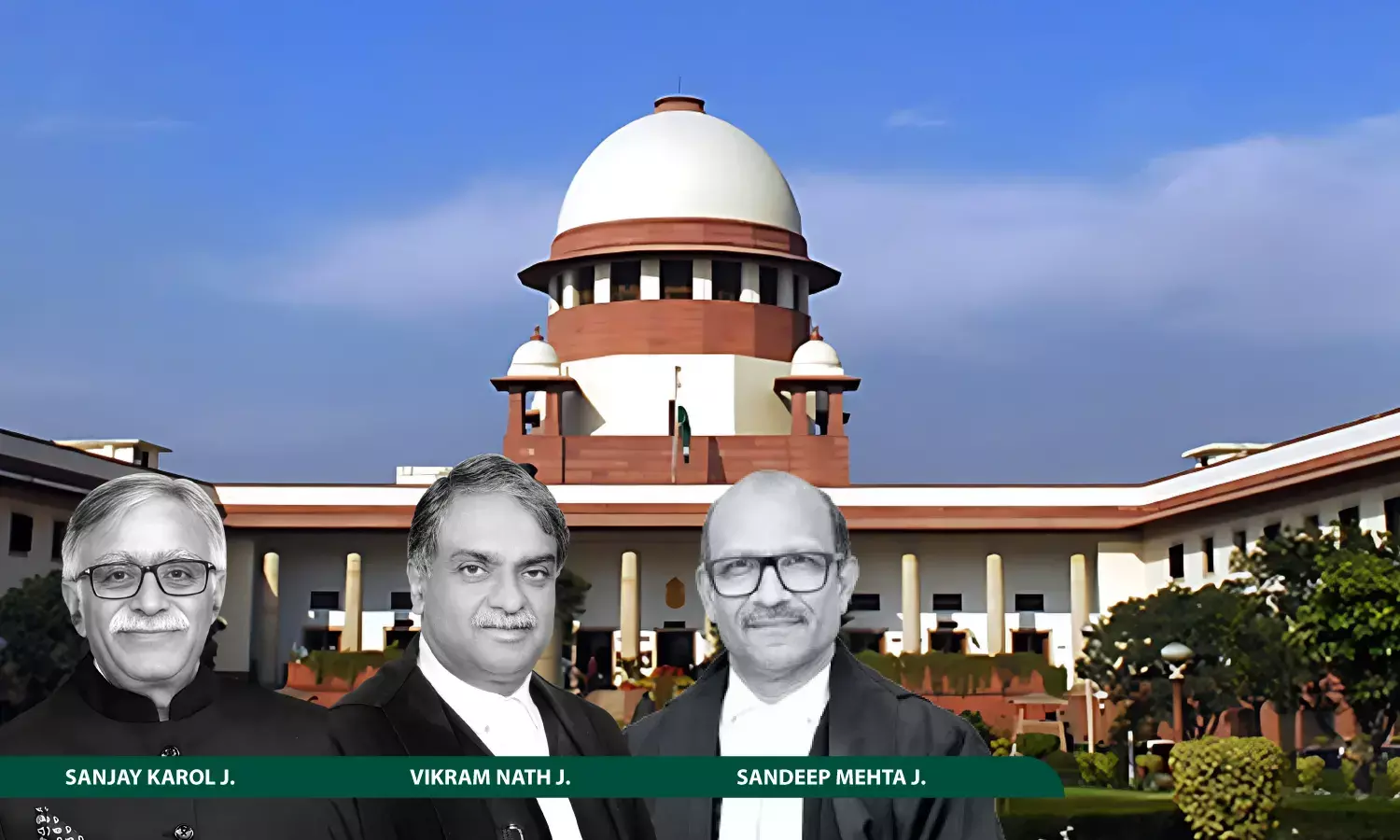Difficulties in Mental Health; Good Conduct For 16-17 Years: Supreme Court Commutes Death Sentence Of Man Convicted For Killing Wife, Children & Raping Daughter
The Appeal before the Apex Court was filed by the appellant accused of killing his wife and four children.

The Supreme Court has commuted the death penalty of a man who killed his wife, four children and raped his minor daughter after noting his good conduct for the past 16-17 years of incarceration and difficulties in his mental health.
The Appeal before the Apex Court was filed by the appellant accused of killing his wife and four children. The Appellant challenged the judgment imposing a death sentence upon him and convicting him in the case registered under Sections 302, 376, 297 and 201 of the Indian Penal Code, 1860.
The 3-Judge Bench comprising Justice Vikram Nath, Justice Sanjay Karol and Justice Sandeep Mehta said, “Keeping in view the discussion made in Ramesh A. Naika v. Registrar General, High Court of Karnataka Etc. and considering the facts that the convict-appellant had no prior antecedents; good conduct for the past 16-17 years of incarceration; difficulties in mental health and consistent efforts at being a model prisoner, we find that the imposition of death penalty would be unjustified. He is, therefore, removed from death row.”
Senior Advocate Sonia Mathur represented the Appellant while Senior Adovcate P.V. Dinesh represented the Respondent.
Factual Background
The appellant-convict was employed in the fields of one Aboobacker Sidique (PW-1) as an agricultural worker and used to live in rented accommodation, in the ownership of Rasheed PW-6. In the course of such employment, he developed intimate relations with Baby alias Usha PW-24. His wife Lissy went missing on July 9, 2008 and after two days he took his son and third daughter saying that he would return with his wife and children. Thereafter, the neighbours made repeated inquiries but were always met with evasive answers.
After almost 10 days, the neighbours noted that the house was locked. When no response came after knocking on the door, three people secured entry and found the appellant’s two daughters lying prone, dead. The police were informed, and accordingly, FIR was registered. On July 25, 2008, the bodies of the appellant’s wife, the son and the third daughter were discovered in the septic tank and the nearby fields. The accused appellant was taken into custody. The appellant-convict was sentenced to death. The Trial Court also sentenced him to 10 years’ rigorous imprisonment for the offence under Section 376 IPC and rigorous imprisonment of 7 years for the offence under Section 201 IPC. The sentences were to run concurrently. The High Court also confirmed the sentence. Aggrieved thereby, the appellant approached the Apex Court.
Reasoning
The Bench took note of the suspicious conduct of the convict-appellant in repeatedly giving false statements regarding the whereabouts of his wife and children when enquiries were made about them. He didn’t turn up or make himself available even after the incident had been reported widely across all forms of media. He also travelled to Kottayam immediately after the death of his son and third daughter. He had called up PW-24 on the same day, expressing a desire to meet her. By such time, the news regarding the death of two of his children had spread, and when she informed him of the same, his response was allegedly cool.
“It is inconceivable to us as to how a person can have a calm response, brushing off allegations levied against him of having killed his own children, especially, when the same is being informed to him by a person who possesses intense feelings for and because of which she refuses to meet him”, the Bench said.
It was further noticed that the prosecution has used scientific and medical evidence to establish the factum of rape being committed on the first daughter by the convict-appellant. There was also indications of prior sexual assault. The DNA Report showed that semen collected from the convict-appellant matched the biological fluid present in the vaginal swab of the first daughter.
"With the above discussion, the primary charges of Sections 302 (four counts) & 376 (one count) IPC, stand proved. We affirm the findings of the Courts below. The conviction of the convict-appellant, therefore, remains undisturbed”, the Bench held. The Bench further noted that the Courts below, upon consideration of a sum total of circumstances, found the instant case to be fitting into the rarest of rare doctrine as discussed in Bachan Singh v. State of Punjab (1980). Referring to the judgment in Ramesh A. Naika v. Registrar General, High Court of Karnataka Etc. (2025) and considering the facts that the convict-appellant had no prior antecedents, good conduct for the past 16-17 years and consistent efforts at being a model prisoner, the Bench held that the imposition of the death penalty would be unjustified.
“However, considering the severity of the crime, the number of persons killed, that out of five four were his own children, we are of the view that he does not deserve to be set free and direct that he shall spend the remainder of his days in jail, till his last breath, hoping to do acts of penance to atone for the crimes he has committed and particularly for the fact that he extinguished four bright flames”, the Bench held while commuting the death sentence to life imprisonment till the end of natural life.
Cause Title: Reji Kumar Alias Reji v. State of Kerala (Neutral Citation: 2025 INSC 538)
Appearance:
Appellant: Senior Advocate Sonia Mathur, Advocates Shreya Rastogi, Adv. Ms. Sakshi Jain, Adv. Ms. Maulshree Pathak, Adv. Ms. Ronika Tater, Adv. Ms. Shubhi Bhardwaj, Adv. Mr. Nikhil Chandra Jaiswal, Adv. Mr. Mukund P. Unny, AOR Mr. Sanjay Nair S, Ad
Respondent: Senior Advocate P.V. Dinesh, AOR Nishe Rajen Shonker, Advocates Anu K Joy, Alim Anvar, Santhosh K, Anna Oommen, Sayed Nazarat Fatima

